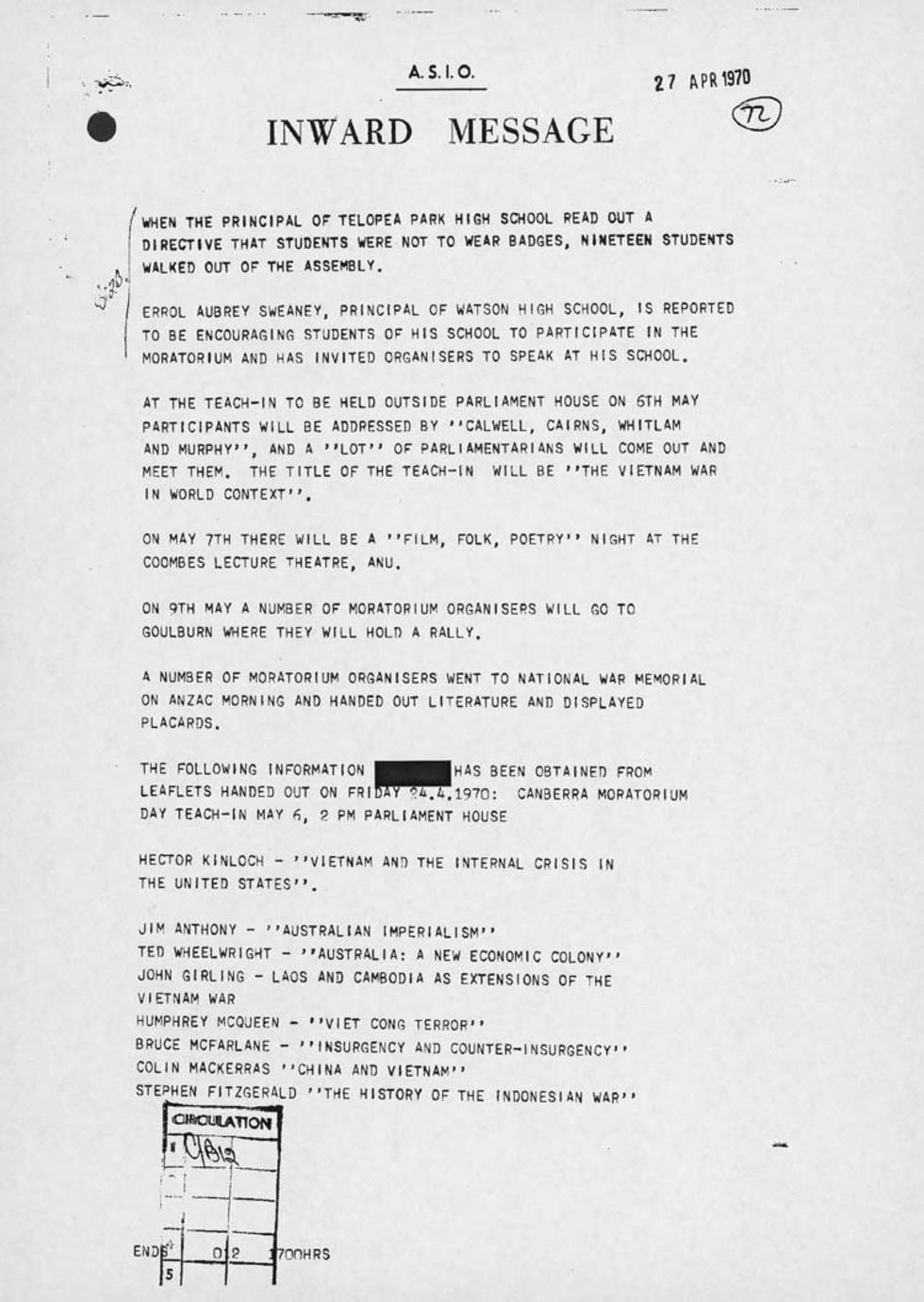


Transcript
A.S.I.O.
[Heading:] INWARD MESSAGE
[Stamped in black ink:] 27 APR 1970/p>
[Handwritten annotation:] 72
WHEN THE PRINCIPAL OF TELOPEA PARK HIGH SCHOOL READ OUT A DIRECTIVE THAT STUDENTS WERE NOT TO WEAR BADGES, NINETEEN STUDENTS WALKED OUT OF THE ASSEMBLY.
ERROL AUBREY SWEANEY, PRINCIPAL OF WATSON HIGH SCHOOL, IS REPORTED TO BE ENCOURAGING STUDENTS OF HIS SCHOOL TO PARTICIPATE IN THE MORATORIUM AND HAS INVITED ORGANISERS TO SPEAK AT HIS SCHOOL.
AT THE TEACH-IN TO BE HELD OUTSIDE PARLIAMENT HOUSE ON 6TH MAY PARTICIPANTS WILL BE ADDRESSED BY “CALWELL, CAIRNS, WHITLAM AND MURPHY”, AND A “LOT” OF PARLIAMENTARIANS WILL COME OUT AND MEET THEM. THE TITLE OF THE TEACH-IN WILL BE “THE VIETNAM WAR IN WORLD CONTEXT”.
ON MAY 7TH THERE WILL BE A “FILM, FOLK, POETRY” NIGHT AT THE COOMBES LECTURE THEATRE, ANU.
ON 9TH MAY A NUMBER OF MORATORIUM ORGANISERS WILL GO TO GOULBURN WHERE THEY WILL HOLD A RALLY.
A NUMBER OF MORATORIUM ORGANISERS WENT TO NATIONAL WAR MEMORIAL ON ANZAC MORNING AND HANDED OUT LITERATURE AND DISPLAYED PLACARDS.
THE FOLLOWING INFORMATION [redacted word] HAS BEEN OBTAINED FROM LEAFLETS HANDED OUT ON FRIDAY 24.4.1970: CANBERRA MORATORIUM DAY TEACH-IN MAY 6, 2 PM PARLIAMENT HOUSE
HECTOR KINLOCH – “VIETNAM AND THE INTERNAL CRISIS IN THE UNITED STATES”.
JIM ANTHONY – “AUSTRALIAN IMPERIALISM”
TED WHEELWRIGHT – “AUSTRALIA: A NEW ECONOMIC COLONY”
JOHN GIRLING – LAOS AND CAMBODIA AS EXTENSIONS OF THE VIETNAM WAR
HUMPHREY MCQUEEN – “VIET CONG TERROR”
BRUCE MCFARLANE – “INSURGENCY AND COUNTER-INSURGENCY”
COLIN MACKERRAS “CHINA AND VIETNAM”
STEPHEN FITZGERALD “THE HISTORY OF THE INDONESIAN WAR”
About this record
This is an 'inward message' prepared by an unidentified agent of the Australian Security Intelligence Organisation (ASIO), dated 27 April 1970. It outlines plans for a 'teach-in' with the title 'The Vietnam War in a world context', to be held outside (Old) Parliament House in Canberra on 6 May. The message states that 'a lot' of federal politicians are expected to come out of parliament to meet the participants, and it names four leading Australian Labor Party (ALP) politicians who will address the gathering. The message also lists various other anti-Vietnam War activities in Canberra, including at two secondary schools and the Australian War Memorial.
Educational value
- This document reveals the extent to which ASIO was involved in the early 1970s in investigating the activities of opponents of Australia's involvement in the Vietnam War (1962–75). From 1962 to 1973 around 60,000 Australians served in the war as part of an allied force led by the United States, fighting with South Vietnamese government forces against the communist-led Vietcong. A Royal Commission on Intelligence and Security found in 1974 that ASIO had focused on anti-Vietnam War activists to an unjustifiable extent.
- This message illustrates the marked increase in anti-war sentiment throughout the late 1960s and early 70s. Public opposition in Australia and the United States grew from the late 60s due to the unpopularity of conscription and increasing casualties among the allied forces. Hundreds of thousands of people took part in a series of anti-war 'moratorium' demonstrations in Australian cities in 1970 and 1971, and there were many smaller protests.
- The message indicates how some teachers were involved in the anti-Vietnam War movement. It states that the principal of one school is reported to be encouraging students to attend 'moratorium' demonstrations, and is inviting organisers to speak at the school. Many school students also played an active role in the anti-war movement. The older male students faced the prospect of being conscripted to fight in Vietnam if Australia's involvement in the war continued.
- A 'teach-in', such as that mentioned in this message, was a form of protest staged as a mass teaching exercise that was loosely structured around a particular theme–in this case, the Vietnam War in a world context. This document is evidence that such protests were regarded by ASIO as potentially subversive. The venue, just outside (Old) Parliament House, would have provided an extra reason for security concerns in case of any violence.
- The message illustrates how the agency deemed the involvement of leading ALP politicians at the teach-in as worth reporting. All those named – Arthur Calwell (1896-1973), Jim Cairns (1914–2003), Lionel Murphy (1922–86) and Gough Whitlam (1916–2014) – were opposed to Australia's involvement in the Vietnam War. Opposition to that involvement is regarded as one factor that helped the Whitlam government to win power in 1972.
- ASIO's role is to investigate threats to the security of Australia, its people, and its interests. Threats include espionage, sabotage, politically motivated or communal violence, attacks on Australia's defence system and acts of foreign interference.
Acknowledgments
Learning resource text © Education Services Australia Limited and the National Archives of Australia 2010.
Related themes
Need help with your research?
Learn how to interpret primary sources, use our collection and more.


